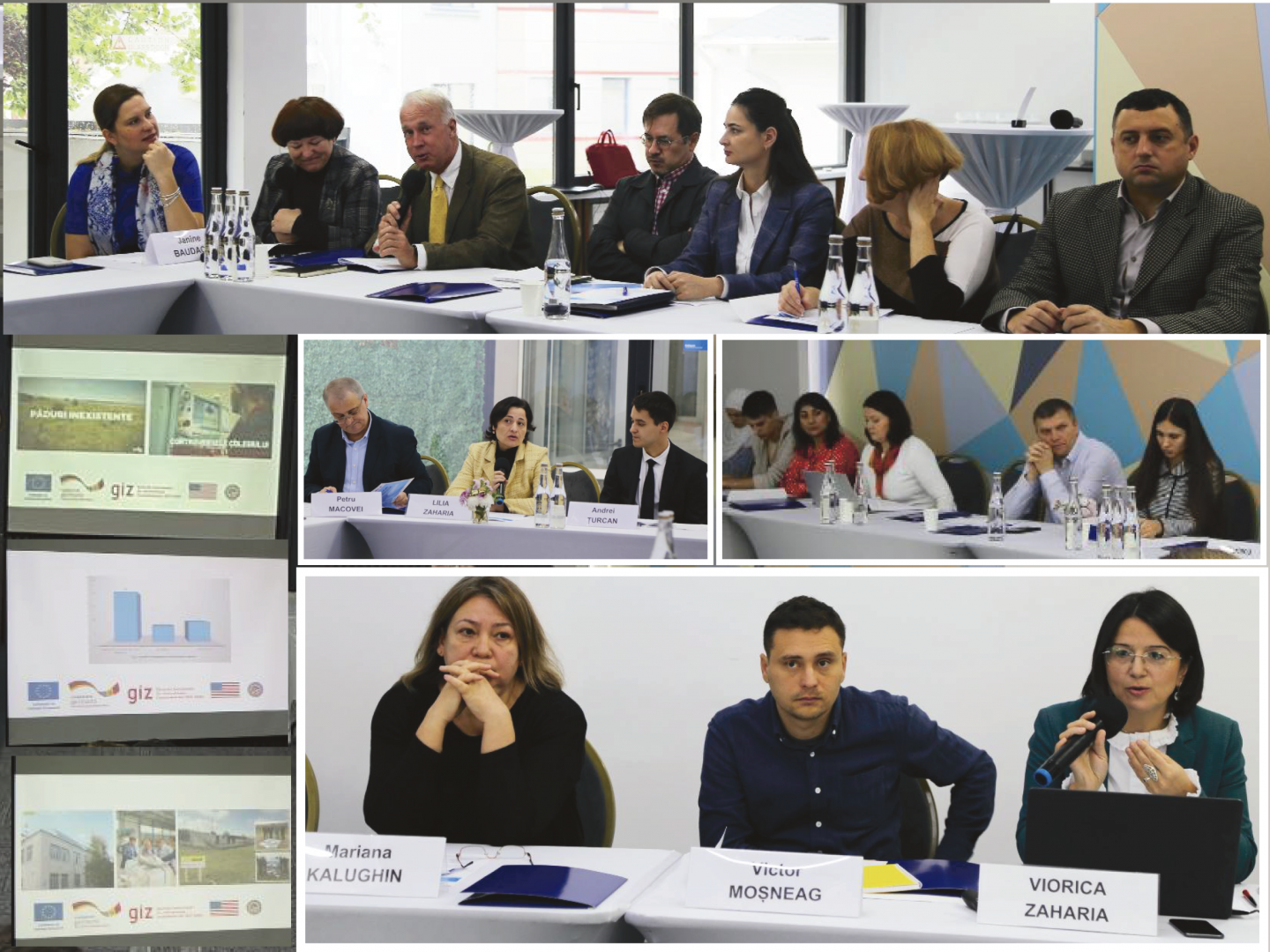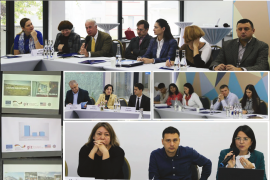back
Study: Most Cases Opened Based on Investigative Media Reports Do Not End with Real Sanctions

Foto: API
The authorities recognize the importance of well-documented investigative media reports for initiating controls and criminal cases. Investigations by journalists are set as one of the outcome indicators for revealing the actual beneficiaries of illegal concessions, privatizations and public procurements in the National Integrity and Anti-Corruption Strategy for 2017-2020. However, experts note low effectiveness of controls and a low number of sanctions applied to people reported by journalists in investigations. These and other relevant findings are contained in the study "Authorities’ Reactions to Investigative Media Reports on Integrity and Corruption," conducted by the Association of Independent Press (API) and Transparency International (TI)–Moldova, presented publicly at a roundtable on Wednesday 1 November 2023.
Janine Baudach, Project Director, German Agency for International Cooperation (GIZ) in the Republic of Moldova, Kevin Laningan, Senior Legal Adviser, Andrei Țurcan, Legal Program Coordinator in the Criminal Justice and Law Enforcement Section of the US Embassy, and Lilia Zaharia-Cravcenco, Director of TI–Moldova said words of greeting at the event opening. The speakers mentioned the role of investigative journalists in exposing corruption and lack of integrity of public officials. They also called on anti-corruption NGOs, investigative journalists, state institutions and donors to work together to strengthen the rule of law in Moldova.
The authors of the study – investigative journalists Viorica Zaharia and Victor Moșneag – presented the methodology and results of the research. They mentioned that only 38 investigative media reports, published between January 2021 and July 2023, which met both thematic and professional criteria were selected out of more than 100 investigative reports initially analyzed. "We set out to look at whether law enforcement agencies really take investigative media reports into account and launch their own investigations, but also to see what the end results of such investigations are. Out of the 38 investigations analyzed, more than half (22) were reacted to; however, in 13 cases, the investigation or control was stopped. In other words, there was a reaction and a certain impact in the short term, but things have not changed and there is no end result in the long-term," Viorica Zaharia said.
As an example, the case of Ghenadie Tanas, former head of directorate at the National Anti-Corruption Centre, recently sent to trial on several charges, targeted for the first time in an investigative media report in 2017, was presented. After that investigation, law enforcement agencies said there were no elements of law violation in Tanas' actions. "It was only in 2021, after he had been discussed in Parliament and another story had been subsequently published, that the law enforcement agencies reacted differently and detained, investigated and sent him to court. It is a case that shows that the authorities act with discretion," Victor Moșneag said. He also referred to the problematic access to information: "Many times we repeatedly requested information, because the first response contained inaccuracies or no information on cases where we were certain that controls had started. Another problem is that some authorities have responded to requests for information for this study in violation of the legal deadline, and this is a sad thing." The study's authors also found that there was no automated database that would integrate information about people in criminal proceedings or cases.
Another author of the study, Mariana Kalughin, TI–Moldova expert, evaluated the end results of acts finding conflicts of interest, issued by the National Integrity Authority (NIA), especially of controls initiated based on information from the media. "In seven years, only 10 acts issued/adopted/concluded in violation of the conflict of interest regime have been found to be absolutely null and void and annulled by court decision, at NIA’s request. Following a finding of violation of the conflict of interest regime, 77 persons were disqualified from holding public office for a period of 3 years and 73 persons were fined. To date, no final and irrevocable judgement has been issued for exercising public sector duties in a conflict of interest situation. Nor have there been court decisions ordering, at NIA’s request, recovery for the state of damages caused and benefits obtained as a result of acts and decisions made in violation of the conflict of interest regime," the expert said. In her opinion, these very modest results indicate the low efficiency of NIA and reveal that the principle of integrity in public office is not respected in our country.
The authors of the study presented a set of recommendations for anti-corruption institutions, NGOs and investigative journalists, followed by an exchange of views on the need to amplify the impact of investigative journalism in the fight against corruption. Alina Munteanu, Integrity Inspector at NIA, explained the reasons for the increasing rate of refusals to initiate controls of alleged conflicts of interest reported by the media. She noted that after changes to the law, integrity inspectors could not check cases older than 3 years, and the time limits for prior verification had been extended from 15 to 30 days, allowing inspectors to gather more evidentiary information and make a correct decision. For his part, Sergiu Doina, investigative inspector at the National Anti-Corruption Centre (NAC), explained why some NAC employees continued to work even though they had been targeted in investigative media reports, noting that additional evidence was needed in each case in order to take legal action to sanction or to bring criminal cases. In order to guarantee a reaction after the publication of investigative media reports, he urged the authors to submit requests to the anti-corruption institutions and ask for information about the initiation of controls and their results. Representatives of NIA, NAC and the Anti-Corruption Prosecutor's Office (APO), present at the round table, gave assurances that they would take action after the publication of well-documented investigative media reports.
At the end of the event, Petru Macovei, Executive Director of API, noted that this was the fourth study on this topic, developed by API, and the conclusions were far from the expectations. There was no finality in the actions taken by investigative bodies after the publication of high-profile investigative media reports, the persons concerned were often not sanctioned in general or the sanctions were modest. Communication between journalists and law enforcement agencies remained problematic, making it difficult for media professionals to work. "Only when these problems have been resolved will we be able to talk about a joint effort in the fight against corruption and greater efficiency in such activities," P. Macovei concluded.
The video of the round table can be accessed HERE.
Study "Authorities' Reactions to Investigative Media Reports on Integrity and Corruption"
For details contact us at ion.mazur@api.md or at 022/220995 / 068983983 (contact – Ion Mazur).
The study was carried out in the framework of the projects:
- "Strengthening the Rule of Law and Anti-Corruption Mechanisms in the Republic of Moldova" is co-funded by the European Union, German Federal Ministry for Economic Cooperation and Development (BMZ) and implemented by German International Cooperation Agency (GIZ). Partners of the project in Chișinău are the Association of Independent Press (API) and the Center for Investigative Journalism (CIJM) which implement the project “Strengthening a Network of Investigative Journalists in Moldova and Increasing Their Capacities to Investigate Corruption Cases”;
- "Mobilizing Civil Society to Monitor and Report on Integrity of State Institutions and Anticorruption Activities in Moldova" implemented by Transparency International–Moldova with the support of the Criminal Justice and Law Enforcement Section of the Embassy of the United States of America in Chișinău
